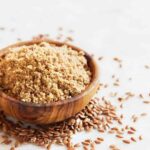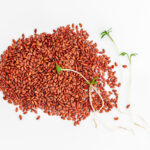More About Whether Wheat/Gluten Are Really the Devil
I got a lot of mail about my newsletter on whether it’s appropriate to vilify all grains, and all gluten. Thanks for the feedback and personal experiences you shared!
That original newsletter about whether we should really stop eating grains, is on my blog, HERE. Feel free to share your thoughts.
A couple of the biggest reasons I resist the idea that all grains are bad are these:
- Don’t throw the baby out with the bath water! Many grains don’t even contain gluten, and haven’t been hybridized. In Africa, millet, faro, and amaranth are staples. They’re available in North America, too, they’re inexpensive, they store well, and they’re easy and quick to prepare.
- If you don’t eat grains, you virtually have to eat meat. People usually eat one or the other. It’s hard to get enough calories without any grains, or any animal flesh. (Forget about the protein obsession. It’s a myth that you need to eat animals to get protein. And virtually no one is protein deficient–many eat far too much protein, though. The World Health Organization states that 5 percent protein in the diet is ideal, and the average vegetarian gets double that amount. Greens are low in calories, but very high in protein.)
And if you eat meat, you have a whole host of other problems. If you eat grass-fed, free range, or wild caught, you’re at much lower risk of eating steroids, hormones, heavy metals, and other toxins. But meat eaters virtually never eat all clean meats. First of all, they virtually never serve grass-fed or free range in 99+ percent of restaurants. Generally, people who eat animal flesh at home eat it in restaurants, too. Second, hardly anyone can afford clean meat all the time. And conventional meat should not be eaten, period.
Meat lovers don’t realize that most of their meats are grain fed. Americans are addicted to grain-fed animals (the meat is tender when fed grains, not to mention cheaper to raise). If the animal was fed conventional grains, then you have most of the same health risks as if you ate the conventional, hybridized, sprayed grains!
So, what’s your choice here?
Eating grains still costs 10 percent what eating grass fed, organic animal products do. (I’m trying not to go off on a tangent about the REAL cost of raising animals for human food—if government price supports were removed, your chicken and beef would cost $20/pound! I believe price supports collapsing is a matter of when, not if.
So, when we vilify major food classes, what’s left to eat?
And, what’s worse, eating a lot of meat? Or eating lot of grain?
My simple answer is.
Eating meat is worse. Not all meat, and I’m not opposed to it categorically, nor am a vigilante vegan. But because eating clean meat is virtually impossible if you EVER eat out. Because of the heavy impact on the environment of meat-eating. Because if it’s really clean meat, you won’t like it–the beef is tough! (I do think that organic butter, eggs, and small amounts of clean animal products, especially fermented dairy like kefir or sour cream, can be part of a very healthy diet).
Because eating gluten-free is a lot easier. Because grains are ubiquitous, cheap, and raising them is easy on the environment.
You can store grain against an emergency, but not meat. (Sure, you can freeze it, but what if the power goes out?) Your hand-crank grain grinder and any emergency cook-stove or even the sun can make very nutritious sprouted-grain breads.
That said, there are some issues with grains, besides hybridized glutens that assault your digestive system and your immune system. If you feel like delving deeper into the controversies, and I don’t pretend to have all the answers here, just sharing more theories and information with you, here are a few things to consider:
One, Jordin Rubin and a number of other experts say you shouldn’t eat any stored grain, because it molds. I do think wheat and other grains stored in silos can be problematic. I avoid corn, soy, and most wheat (except organic, sprouted–and preferably ancient grains like Einkorn, spelt, Kamut). They are the most hybridized, the most genetically modified, and the most stored in huge quantities for long periods of times in silos. If you can find a local small farmer growing ancient grains organically, support that effort and buy grains from these safe sources.
Secondly, I also think there is an issue with diets high in many grains causing sulfur deficiencies in humans. You can read a thorough discussion of this by Mercola, interviewing Dr. Stephanie Seneff of MIT about this.
(You’ll get far more than you bargained for, reading this report or watching the interview–about how dangerous the sugar-rich American diet is, and how devastating statin drugs are!) The bottom line is that it may be a good idea to take MSM (a natural, organic sulfur), and soak in baths with Epsom salts. This is very helpful for those with arthritis or other joint issues.
Dr. Seneff backs the Weston A. Price Foundation, saying that butter and some foods high in fat (full-fat cultured dairy products) are good for you. (You can get sulfur from one of my favorite foods, though, too–coconut oil! Also Brussels sprouts, kale, asparagus, and legumes!)
Read more HERE about MIT’s Dr. Stephanie Seneff’s discussion of sugars, grains, sulfur, drug approaches to cholesterol, and more.
Feel free to share your own experience about eating grains, gluten intolerance, or anything else useful to GSG readers. The original “gluten theory” blog is HERE.
Posted in: Whole Food














